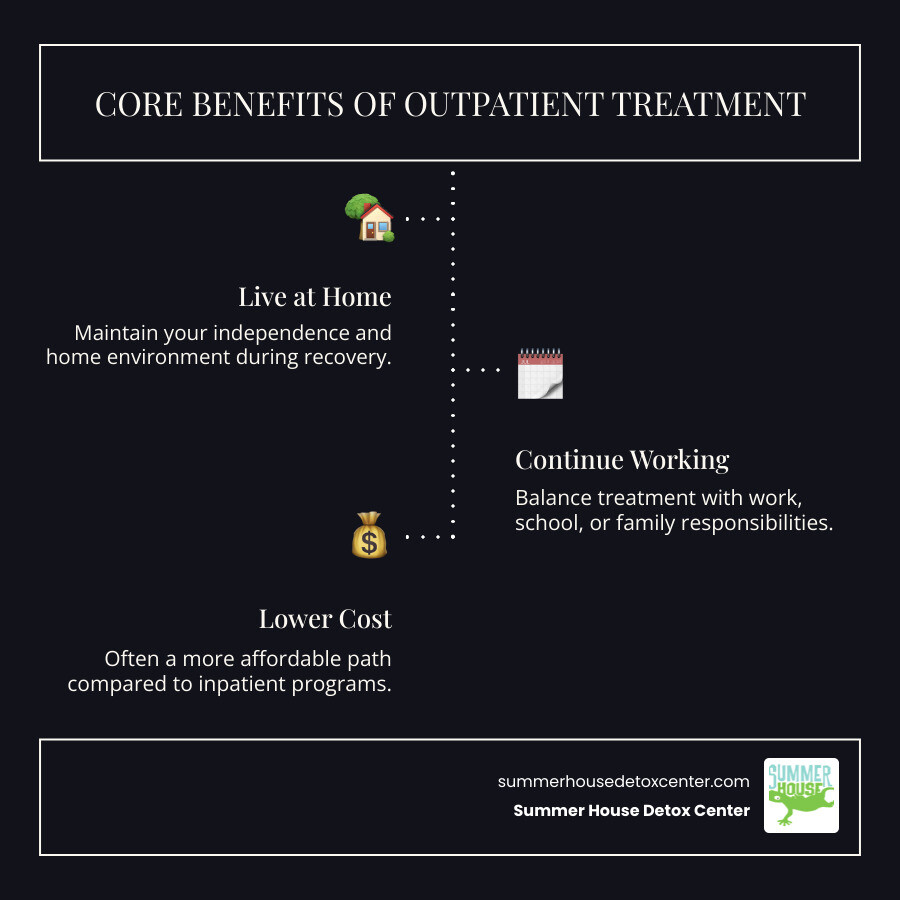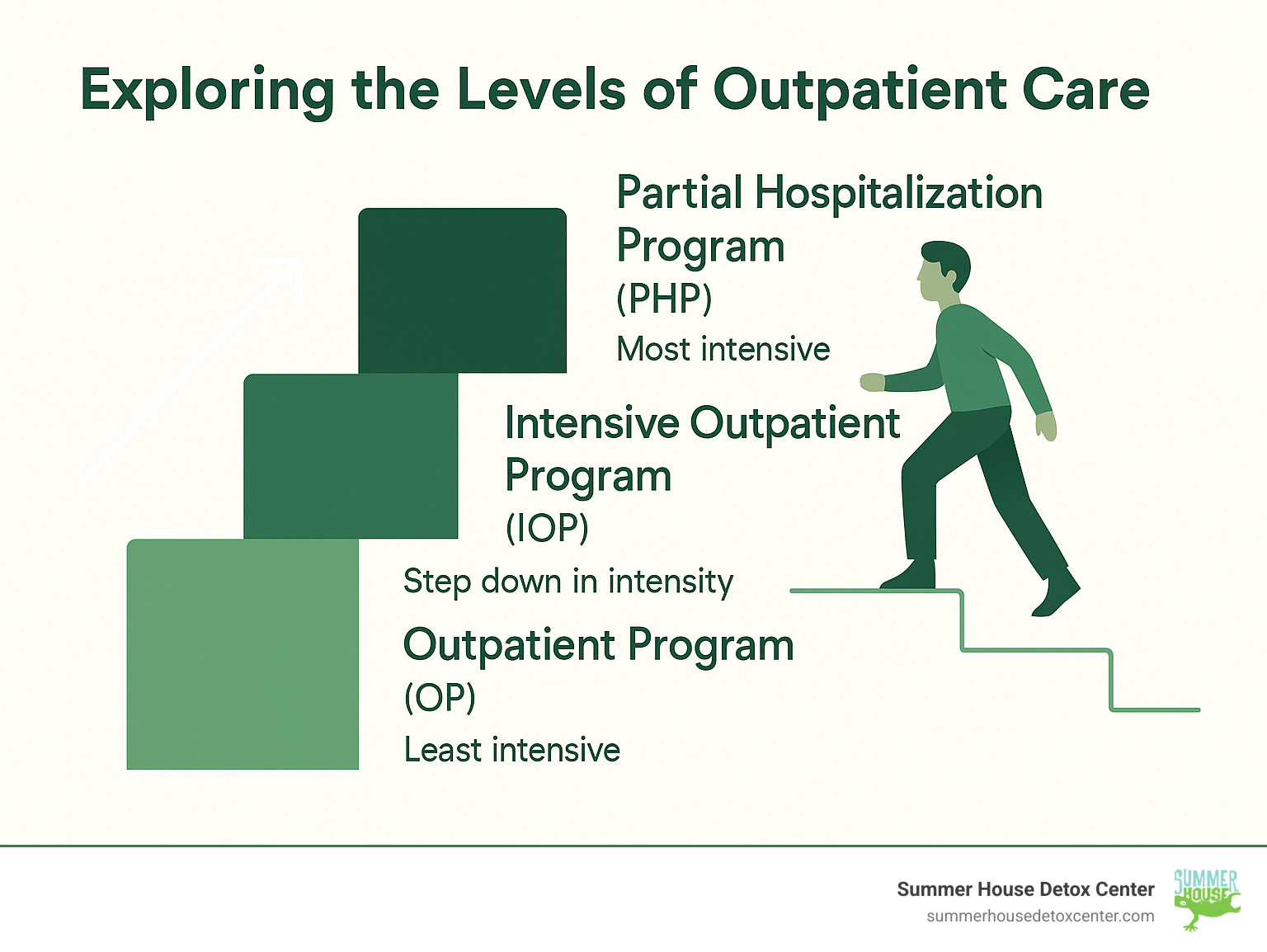Your Recovery Journey Starts Here: Finding Outpatient Treatment Near You
If you’re searching for outpatient treatment near me, you’re looking for help that fits into your life. This approach allows you to get effective care for a substance use disorder without putting work, school, or family commitments on hold.
Here’s a quick overview:
- Live at Home: You receive treatment at a facility during the day and return home at night.
- Stay Flexible: Keep up with your daily responsibilities while attending scheduled sessions.
- Affordable Care: It’s often a more cost-effective path to recovery than inpatient programs.
- Proven Effective: For many, outpatient care is just as effective as residential treatment.
Feeling overwhelmed by addiction is common, but you’re not alone. Outpatient treatment near me can be a powerful first step, offering the support you need while you stay connected to your community. This guide will help you understand your options and find the best program in your area.

Outpatient treatment near me terms to remember:
Understanding Outpatient Addiction Treatment
When you’re looking for outpatient treatment near me, it’s helpful to understand how it differs from inpatient care. While both lead toward recovery, they fit into your life differently.
Outpatient addiction treatment means you attend therapy at a facility but go home each evening. You maintain your daily routines and connections. In contrast, inpatient care involves living at the facility 24/7 for intensive, structured support. Research shows that for many people, outpatient treatment is just as effective as inpatient care. The key is finding the right fit for your needs.
| Feature | Inpatient Care | Outpatient Care |
|---|---|---|
| Living Situation | Reside at the treatment facility 24/7 | Live at home or in a sober living environment |
| Supervision | Constant, 24/7 medical and clinical oversight | Scheduled sessions, no overnight supervision |
| Structure | Highly structured, immersive daily schedule | Flexible schedule, integrates with daily life |
| Intensity | Typically higher, more intensive | Varies by program level (PHP, IOP, OP) |
| Flexibility | Limited, full commitment to treatment | High, allows for work, school, family commitments |
| Cost | Generally higher | Generally lower |
| Environment | Controlled, therapeutic, removed from triggers | Real-world, allows immediate application of coping skills |
| Ideal For | Severe SUD, co-occurring disorders, unstable home | Mild-to-moderate SUD, strong support system, need for flexibility |
If you’re curious about how these approaches work in practice, you can learn more about inpatient vs. outpatient programs at Summer House Detox Center.
What are the Benefits of Outpatient Rehab?
Choosing outpatient treatment near me comes with significant advantages:
- Flexibility: Schedule treatment around work, school, or family commitments without putting your life on pause.
- Lower Cost: Since you aren’t paying for room and board, outpatient care is more affordable, often allowing for a longer duration of treatment.
- Community Connection: Stay connected to your supportive network of friends and family, who are vital to your recovery.
- Real-Time Skill Application: Immediately practice new coping strategies learned in therapy in your actual environment, which helps new habits stick.
- Maintain Employment: Continue working or attending school, providing stability, purpose, and income during your recovery.
- Family Involvement: Living at home makes it easier for loved ones to participate in family therapy and become active partners in your healing.
What Services and Therapies are Offered?
When you search for outpatient treatment near me, you’ll find a range of services custom to your needs:
- Individual Counseling: Work one-on-one with a therapist to explore the roots of addiction and develop personalized coping strategies.
- Group Therapy: Share experiences and gain support from peers who understand your journey, reducing feelings of isolation.
- Family Therapy: Heal damaged relationships and teach loved ones how to best support your recovery.
- Cognitive Behavioral Therapy (CBT): Identify and change negative thought patterns and behaviors that contribute to substance use.
- Medication-Assisted Treatment (MAT): Combines FDA-approved medications with therapy to manage cravings and withdrawal symptoms, especially for opioid and alcohol use disorders.
- Relapse Prevention: Learn practical strategies to identify triggers and develop a plan to avoid returning to substance use.
- Life Skills Training: Build practical abilities for sober living, such as stress management, financial planning, or communication skills.
To learn more about the therapeutic approaches available, visit our page about behavioral health treatment centers.
Exploring the Levels of Outpatient Care
When you explore outpatient treatment near me, you’ll find it’s not a one-size-fits-all solution. Care is offered at different levels of intensity, allowing you to step down your treatment as you grow stronger in recovery.

There are three main types of outpatient rehab programs:
- Partial Hospitalization Programs (PHP): The most intensive level of outpatient care.
- Intensive Outpatient Programs (IOP): A step down, offering significant but more flexible support.
- Standard Outpatient Programs (OP): The least intensive, ideal for long-term maintenance.

Let’s take a closer look at each level:
Partial Hospitalization Programs (PHP)
Often called “day treatment,” PHPs offer the highest intensity of outpatient care. They serve as a bridge from inpatient care or as a starting point for those needing substantial support without 24/7 supervision. You’ll typically attend treatment for at least 20 hours per week, often five days a week, creating a structured, immersive environment. PHPs are ideal for those who need intensive clinical support to stabilize and build foundational coping skills.
Intensive Outpatient Programs (IOP)
IOPs offer a moderate intensity level of care and are a common step down from a PHP. They are also a great starting point if you have a stable home environment but need more than weekly counseling. You’ll attend treatment for 9 to 20 hours per week, spread across three to five days. The focus is on developing coping skills and addressing underlying issues, with a strong emphasis on group therapy. It’s an excellent choice for those who have found some stability but still need regular, structured support.
Standard Outpatient Programs (OP)
OPs represent the lowest intensity of formal outpatient care, designed for individuals who have made significant progress and need ongoing support to maintain long-term sobriety. The time commitment is typically fewer than 9 hours per week, often just one or two sessions. This flexibility allows you to fully integrate recovery into your daily life. OPs focus on long-term support, refining relapse prevention skills, and can continue for a year or more to ensure lasting recovery.
For more information on comprehensive treatment options, including standard outpatient care, you can explore More info about Miami Substance Abuse Treatment.
Is Outpatient Treatment the Right Fit for You?
Deciding on the right treatment is a personal choice. While outpatient treatment near me offers incredible flexibility, it’s not the best fit for everyone. Understanding who thrives in this setting can help you make an informed decision.

Who is a Good Candidate for Outpatient Treatment?
Outpatient treatment is most effective for individuals with certain key characteristics:
- Mild to moderate Substance Use Disorder (SUD): Best for those whose addiction is not severely debilitating and who are not at high risk for severe withdrawal.
- Strong social support system: A network of supportive family and friends is a major asset.
- High self-motivation: The freedom of outpatient care requires a strong personal commitment to recovery.
- A stable, substance-free living situation: A safe home environment is crucial for focusing on healing.
- Ability to continue with responsibilities: Ideal for those who cannot take extended time away from work, school, or family.
If you’re exploring options for alcohol use disorder, find more custom information at More info about Alcohol Rehab Facilities Near Me.
Is Detox Necessary Before Starting Treatment?
This is a critical question. For those with a significant physical dependence on substances like alcohol or opioids, detoxification is a necessary first step. Stopping suddenly can cause painful and potentially life-threatening withdrawal symptoms, such as seizures or delirium tremens.
A medically supervised detox provides a safe, comfortable environment to manage this initial phase. Medical professionals monitor your health and can provide medication to ease withdrawal symptoms, stabilizing you physically and mentally. Detox prepares you for the therapeutic work of recovery.
For severe dependence, a medically supervised detox is essential. Facilities like Summer House Detox Center provide this foundation for a safe recovery journey, focusing on your comfort and dignity with support from experienced staff. To learn more about safe detoxification, visit More info about Detox Centers in Miami.
Potential Challenges and Considerations
While outpatient treatment has many advantages, it’s wise to be aware of potential challenges:
- Lack of 24/7 Supervision: Returning home daily means more freedom but also more exposure to triggers and potential access to substances.
- Managing Triggers: Applying coping skills to real-world stressors requires significant self-discipline.
- Reliance on a Support Network: Success is often tied to having a supportive home environment and accountability outside of therapy sessions.
- Transportation: Consistent attendance is vital, so reliable transportation to and from the facility is necessary.
Being prepared for these challenges can make all the difference in your journey to lasting recovery.
How to Find the Best Outpatient Treatment Near Me
Finding the right outpatient treatment near me doesn’t have to be overwhelming. By focusing on quality and asking the right questions, you can locate a program that fits your unique needs.

What to Look for in an Outpatient Treatment Near Me
When searching for a program, prioritize quality. Look for these key characteristics:
- Licensed Staff: Ensure the team includes qualified and credentialed professionals like addiction counselors, doctors, and nurses.
- Evidence-Based Therapies: The best programs use scientifically proven approaches like Cognitive Behavioral Therapy (CBT) or Motivational Interviewing.
- Individualized Treatment Plans: A good program will tailor its approach to your personal history, needs, and goals.
- Co-occurring Disorder Treatment: Since addiction often co-occurs with mental health conditions like anxiety or depression, look for facilities that can treat both simultaneously.
- Aftercare Planning: Quality programs help you plan for life after treatment by connecting you with support groups and continued therapy.
To help you vet potential providers, here are some questions to ask:
- What specific, evidence-based therapies do you use?
- Are your counselors and medical staff licensed?
- Do you treat co-occurring mental health disorders?
- What is your approach to relapse prevention and aftercare?
- What is the program duration and weekly time commitment?
- What is your facility’s philosophy on recovery?
- How do you involve family members in treatment?
- What is the cost, and what insurance do you accept?
Using Online Directories to Find Outpatient Treatment Near Me
Reliable online resources can simplify your search for outpatient treatment near me.
- SAMHSA’s National Helpline and Online Treatment Locator: The Substance Abuse and Mental Health Services Administration (SAMHSA) offers a confidential, comprehensive directory at FindTreatment.gov: Home.
- State Health Department Websites: Many states have their own directories of licensed addiction treatment facilities.
- Insurance Provider Directories: Your insurance company’s website can help you find in-network providers to reduce out-of-pocket costs. The data for many of these directories comes from the National Substance Use and Mental Health Services Survey (N-SUMHSS).
Specialized Outpatient Programs
Many facilities offer specialized programs for specific populations, which can make treatment more effective. When looking for outpatient treatment near me, consider if a custom approach would be beneficial.
- Gender-Specific Programs: Create safe spaces for men or women to address unique issues.
- Programs for Youth: Use age-appropriate therapies and address the challenges facing adolescents.
- LGBTQ+ Affirming Care: Provide an inclusive environment to address unique stressors related to identity.
- Programs for Professionals: Offer discreet, flexible treatment for those in demanding careers.
- Cultural Considerations: Integrate specific cultural or spiritual beliefs to provide more resonant care.
Navigating the Cost and Insurance Coverage
Understanding the financial side of outpatient treatment near me is a key step in accessing care. Concerns about cost are valid, but many options are available to make treatment affordable.
Most reputable treatment centers have an admissions team that can help you with insurance verification. They can explain your benefits and estimate any out-of-pocket expenses.
Does Insurance Cover Outpatient Rehab?
Yes, for most people, insurance does cover outpatient rehab. Federal laws like the Mental Health Parity and Addiction Equity Act (MHPAEA) require health plans to cover substance use disorder services similarly to other medical care.
- Private Insurance: Most private plans cover outpatient treatment. Check if a facility is in-network with your plan to minimize costs like deductibles and copayments.
- Medicaid: This state and federal program for lower-income individuals and families typically covers a wide range of addiction treatment services.
- Medicare: This federal program for those 65 or older or with certain disabilities also includes coverage for addiction treatment.
- Affordable Care Act (ACA) Plans: Plans from the ACA marketplace are required to cover substance use services as an essential health benefit.
To verify your benefits, call your insurance provider or let the admissions team at a treatment center like Summer House Detox Center help you. They can clarify your coverage details and any pre-authorization requirements.
How Much Does Outpatient Treatment Cost Without Insurance?
If you’re paying without insurance, the cost of outpatient treatment near me can vary based on program intensity (PHP costs more than IOP or OP), location, and the specific services offered.
However, many facilities offer solutions to make treatment manageable:
- Payment Plans: Allow you to pay for services over time.
- Sliding Scale Fees: Adjust the cost based on your income.
- State-Funded Programs: May offer low-cost or free treatment, though they can have waitlists.
Don’t let cost be a barrier. Inquire about these options early in your search.
For more information specifically about treatment options in Florida, you can visit More info about Treatment Center in Florida.
Conclusion
The path to recovery is a journey, and choosing outpatient treatment near me is a powerful and flexible way to begin. While facing addiction can feel daunting, there is immense hope for a brighter, substance-free future.
Outpatient treatment offers an effective way to heal while staying connected to your work, family, and community. This guide has provided the knowledge to understand your options and find a quality program that fits your life. Addiction is a treatable medical condition, and support is available.
Taking the brave first step to ask for help is the most important action you can take. We are here to support you on your journey toward a healthier, happier life.
For more information about comprehensive drug rehab options, including those in Miami, you can explore More info about Drug Rehab Miami.
